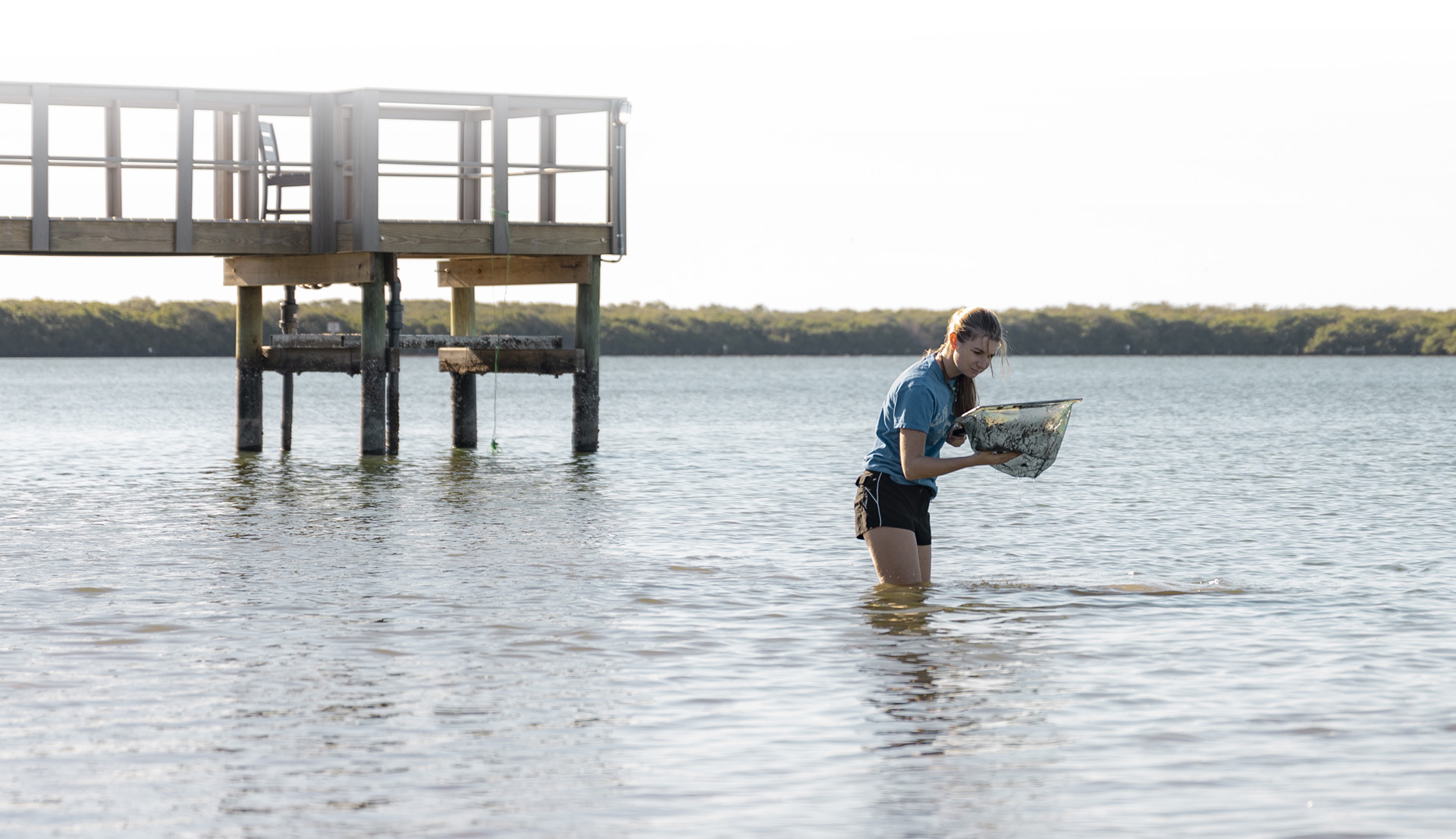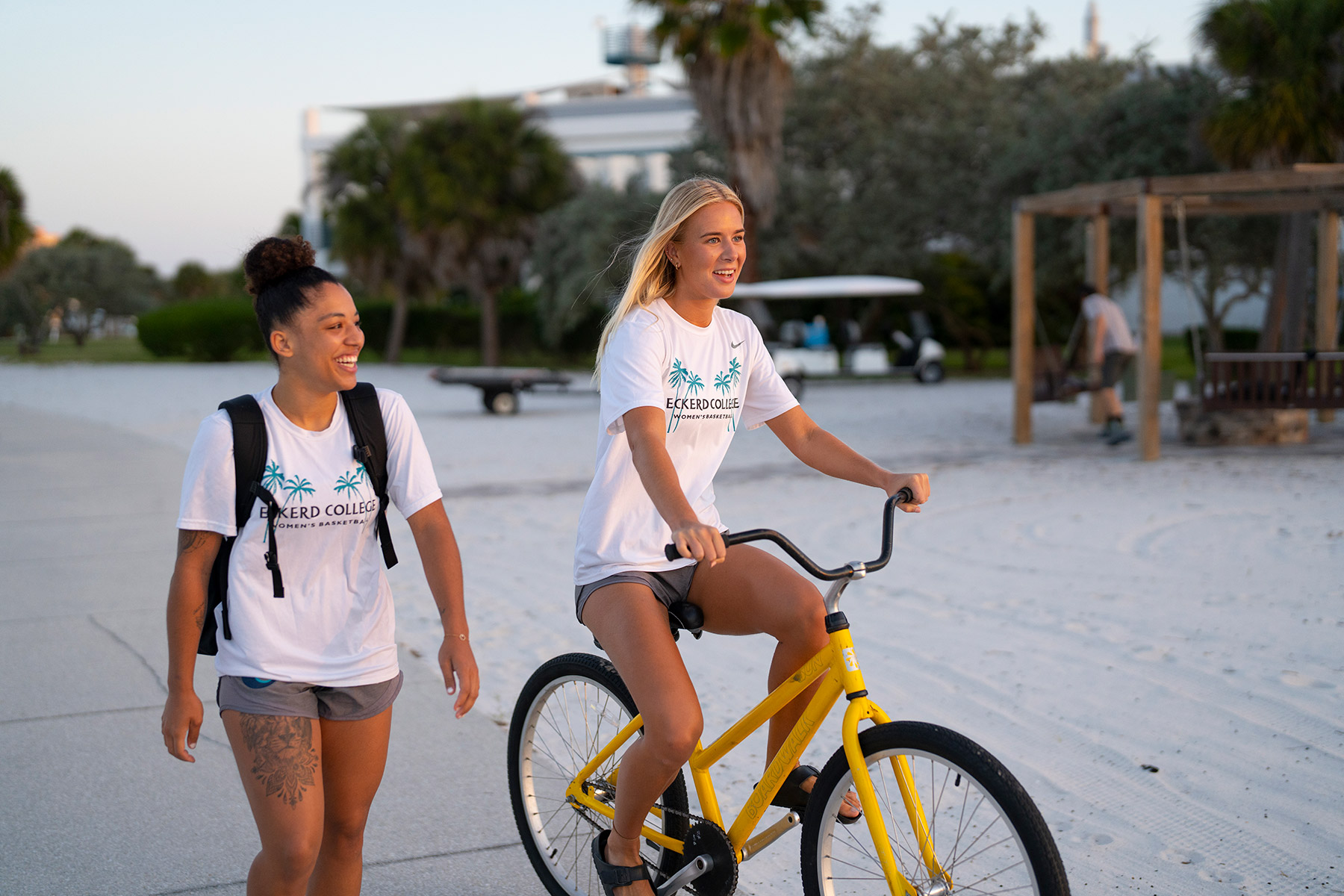Built on Florida’s Gulf Coast, Eckerd College has an academic program, a residential program and a mission that are deeply tied to delivering a high-quality liberal arts education in Florida’s natural environment.
A changing environment
Predictions from the National Oceanic and Atmospheric Administration say that sea level rise is imminent and water will begin to inundate coastal areas over the next 80 years. Eckerd College’s fourth president, Donald R. Eastman III, contracted with Sweet Sparkman Architects, SCAPE Landscape Architecture, and Progressive Water Resources to start building the framework for what our campus and community will look like as our environment changes.
That framework is called Eckerd 2100.

Climate Change Resilience Goals
Plan for change
We’ve seen the models for sea level rise produced by the National Oceanic and Atmospheric Administration for the years 2040 and 2070, and we’re doing something about it.
Integrate ecosystems into campus life and adaptation
We’re committed to using our natural resources—including shoreline, ponds and mangroves—as the starting point for innovation toward more resiliency.
Sustain and improve campus quality of life in spite of a changing climate
On any random day at Eckerd, you’ll find students fishing, participating in watersports, relaxing in hammocks and just walking around enjoying the natural campus setting. It’s important to us to maintain what makes this place great through the coming climate shifts.
Incorporate climate adaptation into Eckerd’s identity
We’re going to be a leader for coastal campuses around the world by making the changes that we institute a part of our fabric and sharing our outcomes.
Immediate-Term Actions
(within 5 years)
Infrastructure upgrades
Begin infrastructure upgrades to address future localized flooding along Avenue of States, Dorm Drive and the access road to the Galbraith Marine Science Laboratory building—including pipe upsizing, green infrastructure and potential roadway improvements.
West side of campus
Begins discussions about whether to raise Forrer Sheen Drive and how that will change access and use to the west side of campus, which will lead to one of two adaptation pathways.
Pinellas Bayway
Begin coordination with the Florida Department of Transportation for them to elevate the low-lying part of the Pinellas Bayway near the campus entrance, and plan associated infrastructure improvements.
Sea level rise at Eckerd
What does resilience mean?
Resilience, in terms of a college, means the campus and community’s ability to continue normal operations in the face of an external threat. For Eckerd College specifically, resilience means the ability to remain in its unique location on Florida’s Gulf Coast—even as sea levels continue to rise.
When you say sea level rise, does that mean the campus will be underwater?
Models from NOAA predict that our coastal waters could rise anywhere from three to 10 feet in the next 80 years. Since much of Eckerd College’s mid-century modern campus was built at sea level, certain parts of the campus may have to be dramatically altered to keep them operational and accessible in the future.
What will happen to buildings on campus if sea level rises significantly?
It’s not “if” sea level rises; it’s when. This framework plan will use community input to consider all parts of campus and help Eckerd College begin to prioritize which projects are most urgent based on the best available information. Some buildings may be fortified, others could be renovated and still others could be relocated. The framework plan will offer a variety of options for College leadership to consider that will maintain the spirit of the institution while preserving the functionality of the College.
Why build this framework now?
Eckerd College’s fourth president, Donald Eastman III, began looking at and planning for sea level rise with the drafting of the Campus Master Plan in 2004. That plan considered changes in sea level prior to construction of the Armacost Library, James Center for Molecular and Life Sciences, Iota Residence Hall, athletic fields and Nielsen Center for Visual Arts. Significant resources will be needed to reimagine an Eckerd College that fits as harmoniously on Florida’s coastline as it does now. Having a framework in place in 2020, so that future administrations can tackle projects little-by-little will help with the resilience of the College and the financial feasibility of this great undertaking. Eckerd College has the opportunity to be the model for all coastal institutions on what solutions will work to remain in our unique environments.
Eckerd College President Emeritus Eastman began looking at and planning for sea level rise with the drafting of the Campus Master Plan in 2004. That plan considered changes in sea level prior to construction of the Armacost Library, Iota Residence Complex, GO Pavilion, James Center for Molecular and Life Sciences, athletic fields, and The Helmar and Enole Nielsen Center for Visual Arts. Significant resources will be needed to reimagine an Eckerd College that fits as harmoniously on Florida’s coastline as it does now. Having a framework in place in the 2020s, so future administrations can tackle projects incrementally, will help with the resilience of the College and the financial feasibility of this great undertaking. Eckerd College has the opportunity to be a model for all coastal institutions on what solutions will work to remain in a coastal environment.
When will we start to see changes on campus?
This plan is just the framework for future administrations and trustees to decide what comes next. Changes will begin when those parties determine the plans are right, the funds are secure and the time is opportune to begin construction.







